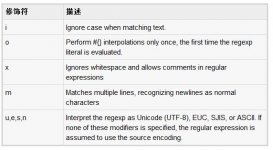Ruby中的循環(huán)用于執(zhí)行相同的代碼塊指定的次數(shù)。本章將詳細(xì)介紹Ruby支持的循環(huán)語(yǔ)句。
Ruby while 語(yǔ)句:
語(yǔ)法:
while conditional [do]
code
end
執(zhí)行代碼當(dāng)條件為true時(shí)。while循環(huán)的條件是代碼中的保留字,換行,反斜杠(\)或一個(gè)分號(hào)隔開(kāi)。
實(shí)例:
|
1
2
3
4
5
6
7
8
9
|
#!/usr/bin/ruby$i = 0$num = 5while $i < $num do puts("Inside the loop i = #$i" ) $i +=1end |
這將產(chǎn)生以下結(jié)果:
|
1
2
3
4
5
|
Inside the loop i = 0Inside the loop i = 1Inside the loop i = 2Inside the loop i = 3Inside the loop i = 4 |
Ruby while 修辭符:
語(yǔ)法:
code while condition
OR
begin
code
end while conditional
執(zhí)行代碼,當(dāng)條件為true。
如果while 修飾符緊跟一個(gè)begin 語(yǔ)句但是沒(méi)有 rescue 或 ensure 子句, 代碼被執(zhí)行前一次條件求值。
實(shí)例:
|
1
2
3
4
5
6
7
8
|
#!/usr/bin/ruby$i = 0$num = 5begin puts("Inside the loop i = #$i" ) $i +=1end while $i < $num |
這將產(chǎn)生以下結(jié)果:
|
1
2
3
4
5
|
Inside the loop i = 0Inside the loop i = 1Inside the loop i = 2Inside the loop i = 3Inside the loop i = 4 |
Ruby until 語(yǔ)句:
until conditional [do]
code
end
執(zhí)行代碼當(dāng)條件為false。until 條件語(yǔ)句從代碼分離的保留字,換行符或分號(hào)。
語(yǔ)句:
|
1
2
3
4
5
6
7
8
9
|
#!/usr/bin/ruby$i = 0$num = 5until $i > $num do puts("Inside the loop i = #$i" ) $i +=1;end |
這將產(chǎn)生以下結(jié)果:
|
1
2
3
4
5
6
|
Inside the loop i = 0Inside the loop i = 1Inside the loop i = 2Inside the loop i = 3Inside the loop i = 4Inside the loop i = 5 |
Ruby until 修辭符:
語(yǔ)法:
code until conditional
OR
begin
code
end until conditional
執(zhí)行代碼當(dāng)條件為 false。
如果 until 修辭符跟著 begin 語(yǔ)句但沒(méi)有 rescue 或 ensure 子句, 代碼一旦被執(zhí)行在條件求值之前。
例子:
|
1
2
3
4
5
6
7
8
|
#!/usr/bin/ruby$i = 0$num = 5begin puts("Inside the loop i = #$i" ) $i +=1;end until $i > $num |
這將產(chǎn)生以下結(jié)果:
|
1
2
3
4
5
6
|
Inside the loop i = 0Inside the loop i = 1Inside the loop i = 2Inside the loop i = 3Inside the loop i = 4Inside the loop i = 5 |
Ruby for 語(yǔ)句:
語(yǔ)法:
for variable [, variable ...] in expression [do]
code
end
一次執(zhí)行代碼的每個(gè)元素在 in 表達(dá)式。
實(shí)例:
|
1
2
3
4
5
|
#!/usr/bin/rubyfor i in 0..5 puts "Value of local variable is #{i}"end |
這里我們定義的范圍 0 .. 5 。因?yàn)樵谡Z(yǔ)句 for i in 0..5 將允許取值的范圍從0到5(含5),這將產(chǎn)生以下結(jié)果:
|
1
2
3
4
5
6
|
Value of local variable is 0Value of local variable is 1Value of local variable is 2Value of local variable is 3Value of local variable is 4Value of local variable is 5 |
for...in 循環(huán)幾乎是完全等同于:
|
1
|
(expression).each do |variable[, variable...]| code end |
除了一個(gè)for循環(huán)不創(chuàng)建一個(gè)新的局部變量的范圍。一個(gè)循環(huán)的表情從代碼分離,保留字,一個(gè)換行符,或分號(hào)。
例子:
|
1
2
3
4
5
|
#!/usr/bin/ruby(0..5).each do |i| puts "Value of local variable is #{i}"end |
這將產(chǎn)生以下結(jié)果:
|
1
2
3
4
5
6
|
Value of local variable is 0Value of local variable is 1Value of local variable is 2Value of local variable is 3Value of local variable is 4Value of local variable is 5 |
Ruby break 語(yǔ)句:
語(yǔ)法:
break
終止大多數(shù)內(nèi)部的循環(huán)。終止塊內(nèi)的方法返回nil如果調(diào)用的方法與相關(guān)塊。
實(shí)例:
|
1
2
3
4
5
6
7
8
|
#!/usr/bin/rubyfor i in 0..5 if i > 2 then break end puts "Value of local variable is #{i}"end |
這將產(chǎn)生以下結(jié)果:
|
1
2
3
|
Value of local variable is 0Value of local variable is 1Value of local variable is 2 |
Ruby next 語(yǔ)句:
語(yǔ)法:
next
跳轉(zhuǎn)到最內(nèi)部循環(huán)的下一次迭代。如果調(diào)用塊一個(gè)塊內(nèi)終止執(zhí)行(帶 yield 或調(diào)用返回 nil )。
例子:
|
1
2
3
4
5
6
7
8
|
#!/usr/bin/rubyfor i in 0..5 if i < 2 then next end puts "Value of local variable is #{i}"end |
這將產(chǎn)生以下結(jié)果:
|
1
2
3
4
|
Value of local variable is 2Value of local variable is 3Value of local variable is 4Value of local variable is 5 |
Ruby redo 語(yǔ)句:
語(yǔ)法:
redo
會(huì)重新啟動(dòng)啟動(dòng)這個(gè)最內(nèi)部的循環(huán)迭代,而不檢查循環(huán)條件。
會(huì)重新啟動(dòng) yield or call ,如果一個(gè)塊內(nèi)調(diào)用。
例子:
|
1
2
3
4
5
6
7
8
|
#!/usr/bin/rubyfor i in 0..5 if i < 2 then puts "Value of local variable is #{i}" redo endend |
這將產(chǎn)生以下結(jié)果,將執(zhí)行無(wú)限循環(huán):
|
1
2
3
|
Value of local variable is 0Value of local variable is 0............................ |
Ruby retry 語(yǔ)句:
語(yǔ)法:
retry
如果 retry 表達(dá)出現(xiàn)在 rescue 子句,則從開(kāi)始重新開(kāi)始。
|
1
2
3
4
5
6
|
begin do_something # exception raisedrescue # handles error retry # restart from beginningend |
如果出現(xiàn)重試迭代,塊,或體內(nèi)的表達(dá),重新啟動(dòng)迭代調(diào)用。迭代器的參數(shù)條件將重新計(jì)算。
|
1
2
3
|
for i in 1..5 retry if some_condition # restart from i == 1end |
實(shí)例:
|
1
2
3
4
5
6
|
#!/usr/bin/rubyfor i in 1..5 retry if i > 2 puts "Value of local variable is #{i}"end |
這將產(chǎn)生以下結(jié)果,將進(jìn)入無(wú)限循環(huán):
|
1
2
3
4
5
6
7
|
Value of local variable is 1Value of local variable is 2Value of local variable is 1Value of local variable is 2Value of local variable is 1Value of local variable is 2............................ |




